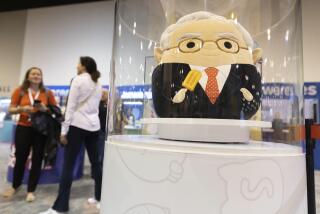Opinion: Left Shark journeys from Super Bowl to Internet meme to lawsuit threat
Just as its 15 minutes of fame were expiring, Left Shark found its way back into the news -- through a fight over copyrights.
For those of you who watched YouTube’s Super Bowl halftime show instead of Katy Perry’s, Left Shark was one of the performers sharing the stage with Perry as she sang “California Gurls.” Unlike the shark behind Perry to the viewer’s right, however, Left Shark was out of sync and, at times, following a choreography of its own creation.
I would like to say that Left Shark was doing the dolphin, but it wasn’t that nimble.
Anyway, the Internet being what it is, Left Shark became an instant star/meme and, temporarily, an integral part of several running jokes (e.g., #BrianWilliamsMisremembers). So naturally, someone decided to make a Left Shark figurine.
And just as predictably, someone else sued for copyright infringement.
The figurine crafter is an Orlando, Fla.-based designer named Fernando Sosa who sells pop-culture and political-themed items through Shapeways, a company in New York City that does 3-D printing on demand. Sosa jumped on the Left Shark bandwagon early this week, offering a miniature version of the character in “full color sandstone” for $25.
“No matter who you were rooting for on this [S]uper bowl[,] we all know who the real MVP was,” he wrote on the site. “Now you can own your own mini left shark that will make you the envy of the office. [I]t’s the perfect size to decorate your desk or home.”
A lawyer for Perry dashed off a cease-and-desist letter to Shapeways on Tuesday, asserting that the company was infringing on Perry’s “exclusive rights to reproduce, display and distribute” the copyrighted images of the Left Shark. The attorney, Steve Plinio, demanded that Shapeways “and all others involved” stop the infringements and send him any of the figurines in inventory, along with promotion materials and an accounting of the sales.
Technically, Perry can’t sue for infringement until she has registered her copyright in the shark costume (or in some states, show that she has filed the paperwork to do so). And the registration process can take months. Nevertheless, Shapeways quickly complied, turning the Left Shark figurine into an “Oops! We can’t find the page you’re looking for.”
The legal issues here are pretty interesting, at least to copyright wonks.
Fashion designs aren’t copyrightable, much to the chagrin of the couture industry. But costumes are another matter, said Eric Goldman, a law professor and copyright expert at Santa Clara University Law School.
An animal costume that’s not generic could be copyrighted, Goldman said, noting the key distinction between ideas (not copyrightable) and expressions (copyrightable). In other words, the distinctiveness that makes a costume shark attractive to figurine-makers is the same quality that makes it copyrightable.
But that raises a second question, Goldman said: Who owns the copyright? If the shark costume was based on an earlier work, the copyrights may have passed into the public domain or may not be Perry’s to enforce. And if someone else designed the shark costume that Perry’s team used, the copyright may still be held by the designer if it wasn’t a work for hire, Goldman said.
Then there’s a third and more novel question: whether a company that offers 3-D printing on demand can be held liable for the infringements of its users. This issue isn’t yet resolved, Goldman said.
Federal law provides a safe harbor for websites and services that provide a platform for users to publish their own works. Manufacturing-on-demand services could be considered analogous to sites such as YouTube and Tumblr; the only real difference is that their products are physical, not virtual. Yet a federal judge ruled last year that CafePress, which makes T-shirts and coffee mugs on demand, didn’t qualify for that safe harbor, allowing a photographer’s infringement claims against the company to proceed.
Sosa has since taken his Left Shark figuring design to MakerBot’s Thingiverse site, offering it as a free download. That’s now an option for anyone with a 3-D printer at home or an unguarded one at the office.
Goldman saw a bright side to the whole episode. “We live in a glorious age that allows us to not only celebrate Left Sharks,” he said, “but to have copyright lawsuits over them.”
Follow Healey’s intermittent Twitter feed: @jcahealey
More to Read
A cure for the common opinion
Get thought-provoking perspectives with our weekly newsletter.
You may occasionally receive promotional content from the Los Angeles Times.











